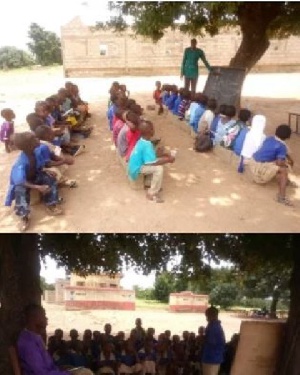About 10 deprived communities in the Tain District of the Brong-Ahafo Region have appealed for basic schools to enable children of school-going age to easily access formal education.
The Ghana News Agency (GNA) investigations showed that because there are no basic schools in those communities, child labour is extremely high as parents and guardians use their children and wards to harvest cashew and engage them in other farm works.
Due to the lucrative nature of the cashew business in the area, some of the children mostly between seven and 15 years have themselves taken advantage of the situation to support cashew farmers and harvest the economic crop for a fee.
Some of the communities are Namasa, Brodi, Debibi, Fabewoso, Abourso, Drobo and Tainso.
Because of the deplorable nature of road networks linking the communities, commercial drivers have virtually refused to ply the roads.
Some children desiring to access formal education have to walk several distances to attend school in some major towns in the District.
The situation is however worsened during the rainy season, as children have to cross rivers and streams before they could go to school.
This came to light at a stakeholders meeting on education on Wednesday at Nsawkaw, the District capital, organised by Action Aid Ghana (AAG), a Non-Governmental Organisation (NGO) in collaboration with the Tain District Directorate of Education.
It is in line with a project being undertaken by AAG with funding support from the United Kingdom Department for International Development (DIFD) and United States Agency for International Development.
The Complementary Basic Education (CBE) project seeks to educate out of school children (Children who have never been to school or children who are dropouts) between the ages of eight and 14 within nine months after which they are transitioned into the formal school system.
The AAG has set up temporary CBE schools in the communities under the project and is training 524 out-of-school children.
The children are expected to be enrolled in the formal education system in the next academic year, starting September 2018.
But, the communities observed with concern that the project would be ineffective if public basic schools were not established in the beneficiary communities.
Mr. Ali Abubakar, a Volunteer teacher at the Namasa CBE, said because many of the CBE schools had inadequate desks as well as few teaching and learning materials, academic work remained ineffective.
Mr. Patrick Doni Dikro, the Deputy Tain District Director of Education in-charge of Administration and Finance, mentioned inadequate educational infrastructure as the major setback to the growth and development of education in the area.
He confirmed that many of the communities deserved public schools but because there was no infrastructure it had become a problem to set up schools in those areas.
Mr. Dikro said providing quality education was a shared responsibility and advised parents to show keen interest in the education of their children and support the government to establish schools in the area.
Ms. Melody Azinim, the Brong-Ahafo Regional Programmes Manager of AAG, noted that effective collaboration was required from all stakeholders to ensure that all school-going age children access formal education.
She stressed the need for the Tain District Assembly to effectively collaborate with the District Directorate of Education to identify and find lasting solutions to problems impeding the growth of education in the area.
General News of Thursday, 15 March 2018
Source: ghananewsagency.org
Deprived communities appeal for basic schools
Entertainment












